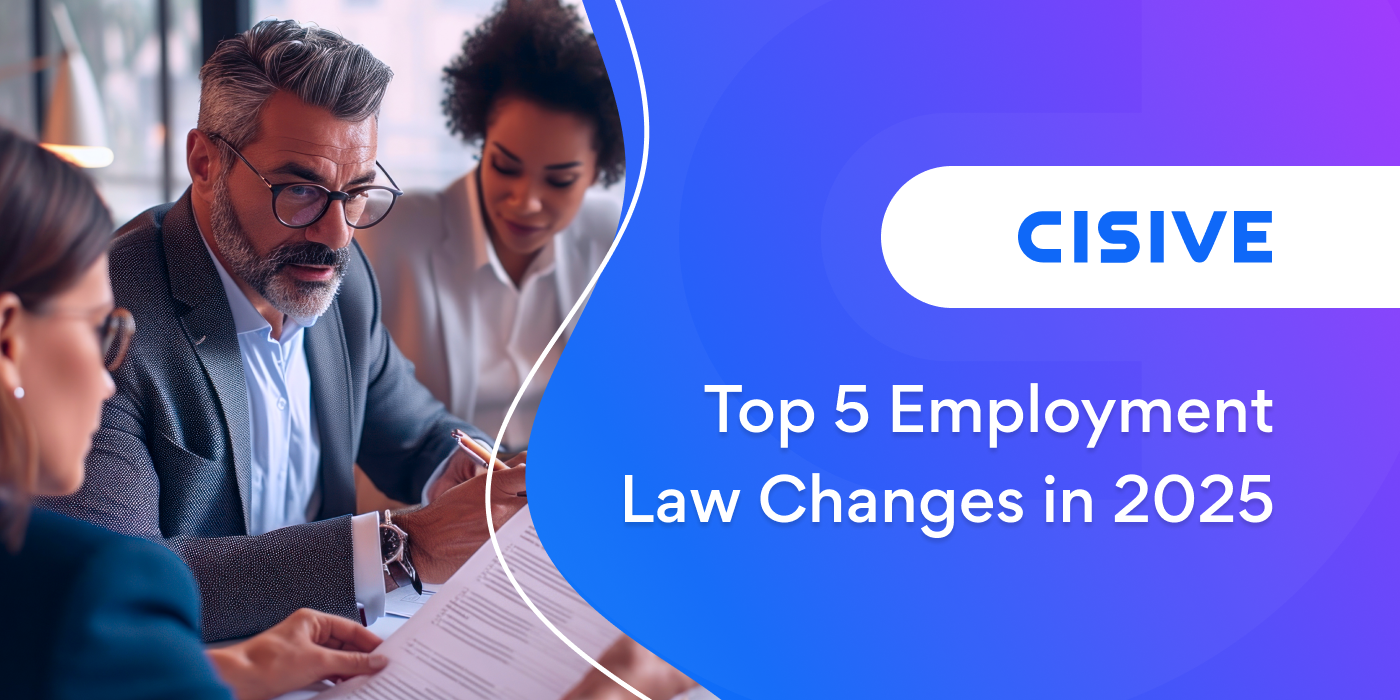As we step into 2025, the labor and employment law landscape is shifting significantly, with new federal and state-level regulations poised to impact hiring practices, compliance policies, and workplace management.
Our recent webinar with Cisive and Arnall Golden Gregory (AGG) covered the most pressing updates in employment law that both federal government contractors and private employers need to be aware of. Here’s a breakdown of key takeaways and what they mean for your business.
1. Federal Employment Law Changes Under the Trump Administration
With the Trump Administration back in office, several federal agencies are undergoing leadership changes that will influence employment regulations:
-
- Equal Employment Opportunity Commission (EEOC): New Acting Chair Andrea Lucas, with one vacant Commissioner seat. President Trump also terminated two Democratic-appointed Commissioners and the EEOC General Counsel, which could lead to legal challenges and operational delays.
- Federal Trade Commission (FTC): New Chair Andrew N. Ferguson, with key regulatory shifts expected.
- National Labor Relations Board (NLRB): Marvin Kaplan appointed as Chair, with two board vacancies. President Trump also removed a Democratic Commissioner, which leaves the NLRB without a quorum to conduct business.
- Department of Labor (DOL): Secretary nominee Lori Chavez-DeRemer set to influence employment standards.
Additionally, an Executive Order issued on January 21, 2025, titled “Ending Illegal Discrimination and Restoring Merit-Based Opportunity”, repeals long-standing DEI-focused initiatives, including one from 1965. Federal agencies are now required to:
-
- Terminate all existing DEI programs.
- Review private-sector DEI policies for potential compliance concerns.
- Identify and investigate companies engaged in "discriminatory DEI practices."
Private sector employers with DEI initiatives should assess compliance risks with legal counsel and prepare for potential investigations.
2. Supreme Court Ruling: The End of the Chevron Doctrine
A landmark Supreme Court decision in 2024 overruled the Chevron Doctrine, meaning courts will no longer automatically defer to federal agency interpretations of laws. This shift gives
courts greater authority to scrutinize regulatory decisions, potentially leading to more litigation and policy reversals. Employers should closely monitor agency rulings and prepare for a more unpredictable regulatory environment.

3. Changes to the Pregnant Workers Fairness Act (PWFA)
The PWFA Final Rule, effective since April 2024, expands employer obligations to accommodate pregnancy-related conditions. Notably:
-
- Coverage includes potential pregnancy, fertility treatments, postpartum depression, and lactation.
- Employees may be entitled to reasonable accommodations even if they cannot perform essential job functions temporarily.
- The rule is facing multiple legal challenges, particularly regarding abortion-related accommodations, and enforcement varies by state.
4. Privacy and Background Screening Developments
Privacy laws are evolving rapidly at both the federal and state levels, affecting background screening and employment compliance:
-
- Consumer Financial Protection Bureau (CFPB): Proposed FCRA rulemaking could expand the definition of consumer reporting, impacting employment screening.
- Department of Justice (DOJ): New restrictions on data sharing related to sensitive personal information, which could affect multinational companies.
- State-Level Privacy Laws: Over 20 states now have omnibus privacy laws, some impacting employee data. California and Colorado have introduced new biometric data regulations, and Colorado’s Biometric Privacy Law takes effect in July 2025.
5. Artificial Intelligence and Compliance Risks
With growing concerns about algorithmic discrimination, Colorado’s AI Act (effective 2026) introduces new compliance requirements for businesses using AI-driven hiring and employment tools. This Act requires employers to:
-
- Conduct risk assessments for AI-driven employment decisions.
- Implement transparency measures, including public disclosures and adverse action notices.
- Ensure AI usage aligns with anti-discrimination laws, as other states may follow Colorado’s lead in regulating AI in hiring.
How Employers Should Prepare
-
- Review Workplace Policies: Conduct a compliance audit to assess the impact of new federal and state laws.
- Evaluate DEI Programs: Ensure initiatives align with current federal guidelines to mitigate legal risks.
- Update Background Screening Processes: Adapt to evolving privacy laws and new FCRA guidance.
- Stay Ahead of AI Regulations: If leveraging AI for hiring, implement compliance strategies now to avoid penalties in 2026.
2025 presents both challenges and opportunities for employers as regulations continue to shift. Staying informed and proactive is key to maintaining compliance and avoiding legal pitfalls. Watch the full webinar here for more information. Need expert guidance? Contact Cisive for a consultation or schedule a free assessment of your background check program.



